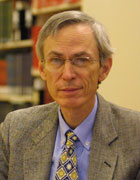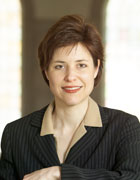WFU professors available for Supreme Court stories
Editor’s Note: Wake Forest University has a direct link to Microspace Communications in Raleigh for uplinking to C- and Ku- band satellite, as well as VYVX fiberoptic for television. We offer ISDN connectivity for radio through NPR member station WFDD, which broadcasts from the Wake Forest campus.
The Wake Forest News Service has prepared a list of experts who can comment on issues related to the retirement of Supreme Court Justice Sandra Day O’Connor and the process for nomination and approval of her successor. These sources can also comment on Chief Justice William Rehnquist. Contact information is provided for two of the experts. To arrange an interview with Dinan or if you have trouble reaching one of the experts, please call the News Service at 336-758-5237. Wake Forest Supreme Court experts include:

Michael Curtis
Michael Curtis, Judge Donald L. Smith Professor in Constitutional and Public Law in the Wake Forest School of Law, can discuss the legacy of Justice Sandra Day O’Connor and the direction that Bush and the Republicans will take when nominating her successor. “If President Bush follows the approach at the Supreme Court level that he has followed for appeals court judges, I think there will be a lot of controversy,” said Curtis, an expert on constitutional law and legal and constitutional history. “The appeals court judges nominated by Bush have been people who are pretty far from the moderate center on a whole range of issues.” Contact Curtis at 336-758-5714, or curtismk@law.wfu.edu.

John Dinan
John Dinan, Zachary T. Smith Associate Professor of Political Science, is an expert on American government and politics. “The first and most important question concerning the fate of any Bush nomination is how to interpret a recent agreement made by 14 moderate Senators that established some guidelines regarding the judicial confirmation process, but left unclear whether 50 or 60 votes would be required for the Senate to confirm a Supreme Court nominee,” said Dinan, author of “Keeping the People’s Liberties: Legislators, Citizens, and Judges as Guardians of Rights.” Dinan said 50 votes should be easy for Bush to find, but if Democrats impose a higher standard requiring the approval of 60 Senators, as they have required of various lower federal court nominees, then we could have a long, contentious confirmation battle this summer.

Melissa Rogers
Melissa Rogers, visiting professor of religion and public policy in the Wake Forest Divinity School, is an expert on the separation of church and state, religion and law and religion and politics. “One can be sure that this administration will take special pains to ensure that it understands a nominee’s views on a range of critical issues and that the nominee can be counted on to reflect that vision once placed on the Court,” said Rogers, an attorney who lives and works in Washington, D.C. “President George W. Bush has been determined throughout his service to avoid his father’s ‘mistake’ of failing to connect with religious conservatives and curry favor with them. In some quarters, it is fervently hoped that President Bush will choose a more centrist nominee, which would allow the president to make some headway toward fulfilling his promise to be a ‘uniter, not a divider.’ But President Bush has already said that he will nominate justices in the mold of justices Scalia and Thomas – nothing would be more unifying for religious conservatives, and more divisive for the country as a whole.” Contact Rogers at 202-904-4936(M), or rogersm@wfu.edu. Rogers previously served as founding executive director of the Pew Forum on Religion and Public Life, and she has served as general counsel of the Baptist Joint Committee on Public Affairs.



